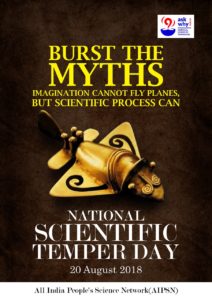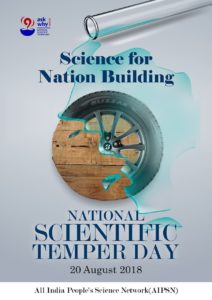click here to get the pdf of PressRelease-VP-AIPSN-26Apr2023nolrhd
click here to get the pdf of pressrelease-VP-AIPSN26Apr2023lrhdunsd
See here for Newsclick coverage
Click here to see Gmail-PMO-VPappeal and AipsnLetterToPMO-regVP-27Apr2023 sent to PMO
Click here to see Gmail-MoS- VPappeal and AipsnLetterToMoS-regVP-27Apr2023 sent to MoS S&T
Click here to see Gmail-DSTSec-VP-appeal and AipsnLetterToDSTSec-regVP-27Apr2023 sent to Sec DST
26 Apr 2023
Press Release
AIPSN Appeal To Strengthen and Not Shutdown Vigyan Prasar
It was shocking and disturbing to learn from the press article titled “An Institution Dies” in The Statesman of 24 Apr 2023 that there is a proposal to close Vigyan Prasar, by August of this year. Vigyan Prasar (VP) was set up in 1989 with a mandate for science popularization, communication and building scientific temper. VP is now an autonomous organization under the Department of Science and Technology, Government of India and is one of the well acknowledged and visible organizations of the DST. VP is a successful organization which has taken up notable initiatives. Still, Niti Aayog has recommended that Vigyan Prasar (VP) be closed and a cell be set up at the DST to perform the functions of VP. The idea seems to be that the objectives can be met and there will be reduction of human and financial resources. Moreover, such an arrangement would be favorable for outsourcing as a way to lower the recurring expenditure. This move in effect will pave the way for contract labor and privatization. Both are not conducive to a continued engagement with science popularization and development of scientific temper and spirit of enquiry which VP has fulfilled as a constitutional mandate under Article 51A (h).
The role of scientific literacy in building a modern society cannot be underestimated. This task is taken extremely seriously by our neighbour China. In 2002, it promulgated a law to popularise science –“Law of PRC on Science and Technology Popularization”. In 2006 its policy document “Outline of National Scheme for Scientific Literacy (2006-2010-2020) was issued. National representative surveys are conducted by its ‘China Research Institute for Science Popularization’ (CRISP), which show that scientific literacy among Chinese citizens has grown from 1.6% in 2005 to 3.7% in 2010 to 8.47% in 2018. As per its 2020 science popularization policy ‘guideline document’ 15% is targeted for 2025 and 25% for 2035.As per this guideline “science popularization is equally vital as scientific and technological innovation”, and is playing a key role in the remarkable technological and economic progress of that country. China has a budget of Rs 20,000 crores for science popularization of which Rs 16,000 crores is government funding. Closing of VP may result in a saving of about Rs 20 crores, but the long term damage to the economy and national interest is inestimable.
Vigyan Prasar has built communication capacities and engaged the people following knowledge enrichment inculcating scientific temper, nurturing critical thinking amongst citizens of the country through Indian languages including local dialects. VP has been inclusive and embraced every strata of the society be it women, physically challenged, tribals, people from remote and geographically inaccessible regions for S&T communication, popularization & extension by producing content. VP has been the only organization in the country that has been working pan India on science & technology communication, popularization and hands-on outreach. The number of school children and youth whose lives it has touched over 32 years across more than 700 districts is enormous. It has acted as an interface between society, scientists, media and policy makers. The expertise, capability and skills that Vigyan Prasar has nurtured and grown will be lost if it is closed or reduced to a cell. VP is not a publicity exercise which can be done by a cell of DST. The development, aggregation and content generation is a skill set that has been nurtured over 30 odd years which cannot be replaced through outsourcing.
Therefore, a decision to shut down Vigyan Prasar is shortsighted, ill considered and contrary to the national interest and objectives. Science popularization and scientific literacy is indispensable for the nation as we seek to go forward to becoming a modern , technologically and scientifically advanced knowledge society. For serious and fundamental reasons this national comprehensive perspective cannot be provided by the private sector.
All India People’s Science Network (AIPSN) appeals to the Government of India to strengthen, rather than close, Vigyan Prasar as its functions do not overlap with any other department of the Govt of India. The country needs more science communication, not less, and on a far greater scale, in all the Indian languages. We have a constitutional obligation to nurture the scientific temper among citizens, and science communication ought to be acknowledged as core mandate of the DST and not relegated to a PR cell outsourcing activity. The country needs a cadre of science communicators, and institutions such as VP need expansion and strengthening towards achieving this. The closing of Vigyan Prasar will be an irreplaceable loss to the country. Vigyan Prasar needs to continue and be empowered even more to serve the country in terms of science communication, popularization, developing critical thinking and scientific temper as part of our Constitutional mandate.
Asha Mishra
General Secretary AIPSN
gsaipsn@gmail.com @gsaipsn
The Success and Notable initiatives of Vigyan Prasar
Vigyan Prasar has produced about 300 books by well known science writers and scientists. These books are appreciated in almost all States in India and also outside the country. The people in VP have been recognized by many awards such as UNESCO Kalinga award in Science Popularization, National Science Popularization Award, Indira Gandhi Prize for Science Popularization of Science, Atmaram Award for Popular Science Book writing. The monthly bilingual journal, in English and Hindi, from VP called Dream 2047 reaches out to young college students and other sections of society.
The contribution of the VP towards nation building has been immense. Some of the notable initiatives by Vigyan Prasar are listed here:
- The Vigyan Basha programme of VP to take science in the mother tongue; this is not limited to only the languages in the 8th schedule but also tribal languages spoken by large sections. Science publications were made in Indian languages (Bangla, Tamil, Kannada, Urdu, Gujrati, and Marathi). Monthly newsletters, Tajassus (Urdu), AriviyalPalagai (Tamil) Bigyan Katha (Bangla) and Kutuhal ( Kannada). There has never been such a massive effort to reach the public with scientific information in their mother tongue. This requires a dedicated team of experts with both science and communication backgrounds.
- India Science Wire which converts research publications from Indian labs into news stories, and helps showcase science and technology developments in Indian institutions. It has been the first time media were galvanised and provided space to cover S&T with inputs from India Science wire regularly. The Indian Science News Feature Service released more than 500 stories with over a lakh tweet impression.
- The India Science TV OTT channel provides videos in Hindi and English for Indian audiences on latest issues. Since it is the only Government based S&T channel which is available as an app it has been able to reach the youth. It has produced more than 2000 films in a period of less than two years with 85 million reach. 500 new video programmes were made. 600 were telecasted on DD Science channel and India Science OTT platform. These programmes were also made available on the video-on-demand section of India Science OTT platform https://www.indiascience.in/
- The production of 25 different Do-It-Yourself (DIY) kits that has been a game changer to inculcate the importance of hands-on approach.
- The two international level science festivals which were the first of its kind in the country.
- The international connections of VP is also seen in the publishing workshops for researchers organised with the American Chemical Society (ACS).
- The implementation nationwide by VP of International Year of Light, Astronomy – for example – declared by the UN and National Year of Mathematics, Biodiversity, to mention just two, declared by the Government of India. The reach of these programs has been remarkable.
- The tie-up with All India Radio to take science based content through engaging plays and local involvement in different States of India reaching around 85 percent population of the country on various scientific themes, especially rural population in their own language . The project through All India Radio covered 118 Stations, made 1040 Radio programmes in 19 national languages and dialects.
- The thirty-five Vigyan Melas, exhibitions, and fairs for Tribal Children were a good example of needed outreach.
- The Gandhi@150 project –Digital exhibition, was organized by VP at 17 locations
- Extensive efforts to provide reliable and authentic information on the issues of national importance and pride such as Covid-19, development of Vaccine on Covid-19 recently and in the past on issues like celestial events and other breakthrough in science and technology by Indian labs and institutes.
For contact
Asha Mishra 9425302012
Krishnaswamy 8012558638




